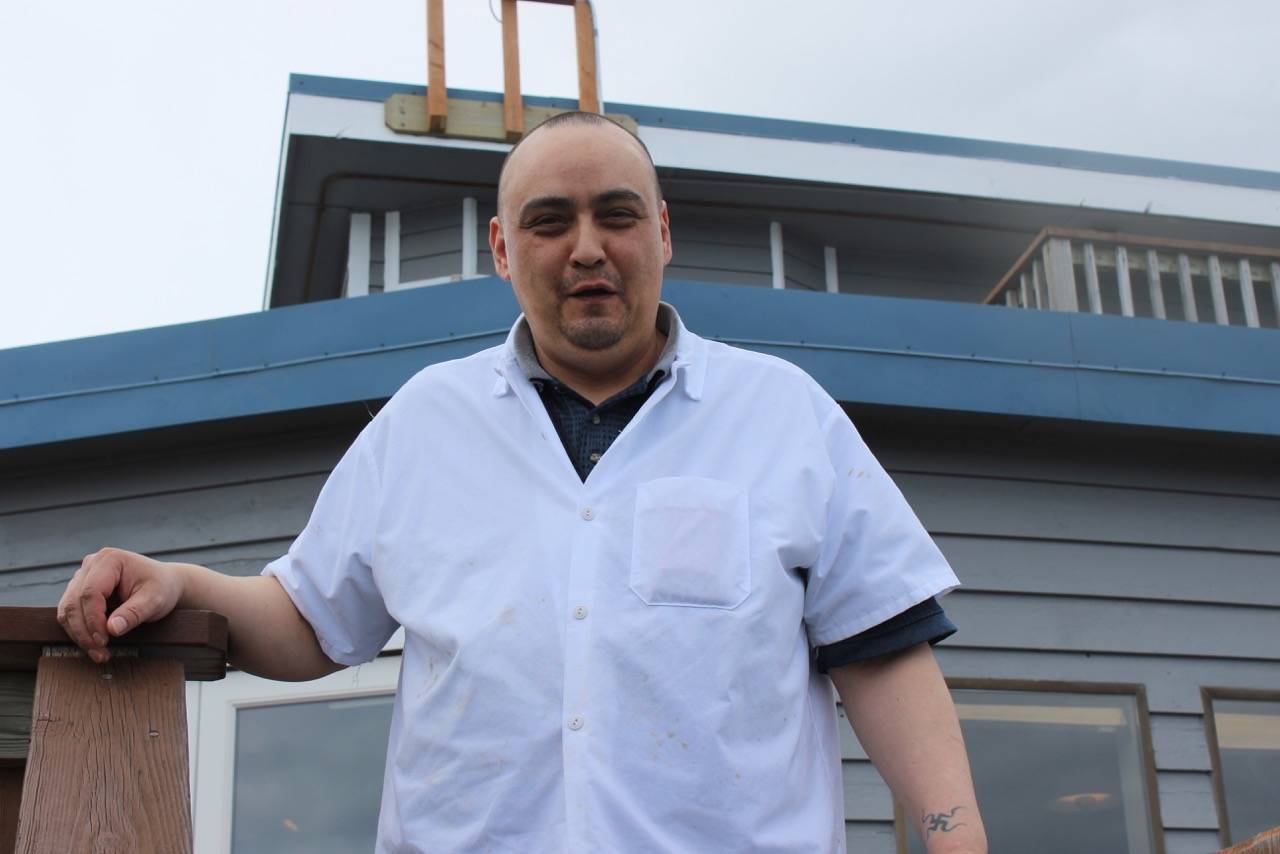If sometime in the last year you’ve had Land’s End Resort’s crab and artichoke dip — a memorable mix of crab, artichoke and cream cheese covered with parmesan cheese and served piping hot with slices of freshly baked bread — chances are it was made by Sung Linder.
“It’s so awesome to put together because you know how good it is,” said Linder, 42, a South Peninsula Behavioral Health Services consumer who found employment at Land’s End through SPBHS’s Individual Placement and Support Program and the efforts of SPBHS staff Amy Smith, IPS supervisor, and Jon McGhee, employment specialist.
Linder’s employment background included doing ironwork on the West Coast before attending Alaska Vocational Technical Center’s culinary arts program and graduating in 2000. In 2017, McGee let Linder know Land’s End was hiring.
“They didn’t have anything but a dishwashing position but I said, OK, anything to get my foot in the door,” said Linder, whose first day on the job was his birthday, April 10, 2017. He has since seen two increases in salary and a month ago began doing some prep cooking, measuring, mixing and parbaking. His favorite thing to prepare: crab and artichoke dip.
IPS is an evidence-based model of supporting employment for people with serious mental illness. While it isn’t new to the rest of the world, Alaska agencies began receiving grants in the past few years to put the program in place and Homer is the first to institute it. After receiving the grant in 2016, Smith, who has 15 years experience in social work, went through IPS training. McGhee, who worked with a similar program for 10 years in the United States and five years in the Philippines, was hired and trained a short time later.
“Amy and I developed it from the ground up and within a month we had our first placement,” said McGhee.
The IPS model views employment as part of an individual’s recovery. Instead of consumers being told to wait to work until other areas of their lives are in order, “if they want to work, we’ll work with them to find a job,” said McGhee.
“We see employment as a normal adult role,” said Smith.
McGhee begins by getting to know consumers, their work history, their goals. Free life skill classes funded by the Department of Labor and taught on Kachemak Bay Campus by adult basic education instructor Michelle Waclawski help individuals prepare for job searches, interviews and employment. In the fall, McGhee attends the classes with the consumers as they learn to manage stress, negative thinking, procrastination, goal setting, time management, self-advocacy and decision-making. In the spring, Waclawski focuses on communication skills, listening and related topics.
“Jon started bringing some folks and the level of success and amount of change that I saw was just amazing,” said Waclawski. “People might not be thinking they’re ready for a job, but then they catch that negative self-talk and begin picturing what they really want and think, ‘Yeah, I can do this.’”
Pat Simmons, also an adult basic education instructor at KBC, builds on what Waclawski teaches, offering tips on creating resumes, writing cover letters and learning work-specific software programs.
McGhee also meets with employers — to date more than 100 — gaining an understanding of their businesses and what is expected of employees.
The IPS model includes competitive employment. Job openings have to be open to anyone, “not carved out for someone with disabilities. My promise to employers is that if I don’t have a good match, I’ll tell them. … Employers appreciate that,” said McGee. He supports the employer-employee relationship by helping with communication, problem solving and whatever issues might arise.
The Homer IPS has a steering committee that meets quarterly. Homer Mayor Bryan Zak, regional director for the Kenai Peninsula Small Business Development Center, and Kim Frost, KBC’s student and enrollment services coordinator, are on that committee.
“It’s been a wonderful opportunity to see the results and methodology of the program,” said Zak. “It’s the whole perfect relationship of consumers and business owners. It’s pretty wonderful to have this in the community.”
Frost said the ISP program “shifts everything to a user perspective, helps consumers take control of their lives and their future with people there to help and support them. … It’s something that I am definitely proud to be part of.”
Earlier this year, the IPS national newsletter ran an interview of a SPBHS consumer who said that, because of her employment, “For the first time in many years, I feel like who I could be instead of feeling like a horrible person.” This week, McGhee and Linder are speaking about the program at a meeting of the Alaska Mental Health Trust Board.
“A saint” is how Linder describes McGhee. “Maybe I need a reference. Maybe I need a resource of some kind. John McGee handles it. The guy’s absolutely wonderful.”
Linder isn’t the only SPBHS consumer to be hired at Land’s End, according to Lea Miller, Land’s End Resort’s general manager.
“We’ve had as many as two at a time. Everyone that (McGhee) has brought to us has been a success, a really good team member,” she said.
Smith and McGee attribute the program’s success to a team effort that reaches beyond consumers and employers.
“It’s a whole team. Case managers, therapists, clinicians, direct service providers. It all comes together with different aspects to make it as successful as it is,” said McGhee.
McKibben Jackinsky is a freelance writer. She can be contacted at mckibben.jackinsky@gmail.com.


